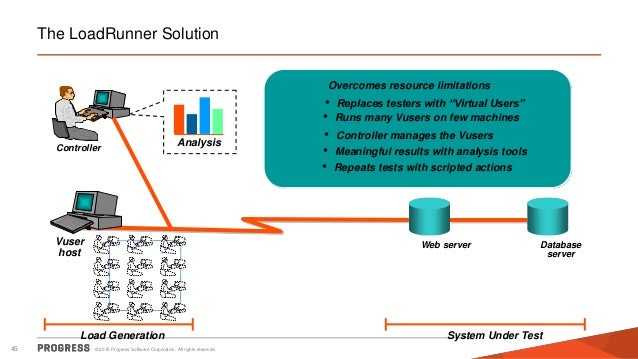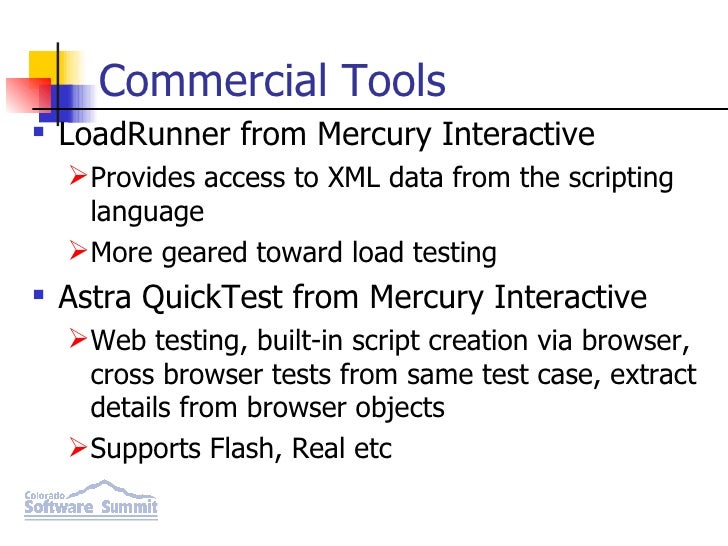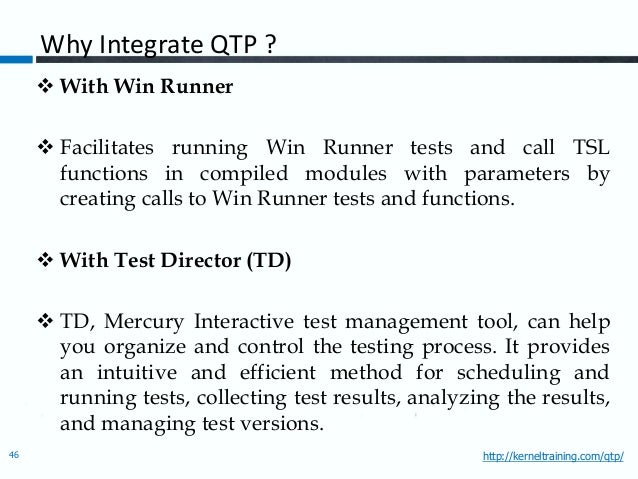Mercury Interactive Testing Tools
Mercury Quality Center is a web-based test management tool having several capabilities, such as scheduling of tests, and the logging of results, progress tracking, incident management and test reporting. It gives a centralized control over your entire testing Project.
This project contains several tools for testing MIDI drivers and devices in the Mac OS X (Darwin) MIDIServer environment. It may also function as sample code for accessing MIDI services on Mac OS X.
- Mac OS X (Darwin) MIDITesting Tools
- Herbie Robinson
- Freeware (Free)
- Windows
Software Testing toolbar for Internet Explorer. Find information about software testing.Easily reach all the information about software testing process, software testingtools, directly from your browser. ..
- softwaretestingnow2_setup.exe
- software testing
- Freeware (Free)
- 1.08 Mb
- Win95, Win98, WinME, WinNT 3.x, WinNT 4.x, Windows2000, WinXP, Windows2003, Windows Vista
QPack Free Software TestingTools for Test Management by Orcanos. Includes Requirements Management and traceability, Test Plan, Test Execution, Defect Tracking - Get Free edition now. A Complete and structured Application Lifecycle Management. ..
- QPackSetupXP.exe
- Orcanos Ltd.
- Freeware (Free)
- 107.94 Mb
- WinXP, Windows2003, Windows Vista
QPack Free Software TestingTools for Test Management by Orcanos. Includes Requirements Management and traceability, Test Plan, Test Execution, Defect Tracking - Get Free edition now. A Complete and structured Application Lifecycle Management. ..
- QPackSetup5.2.zip
- Orcanos ApplicationLifecycle Management
- Freeware (Free)
- 12.95 Mb
- WinXP, Windows2003, Windows Vista
AdventNet QEngine WebTest - An extensive, platform independent web testingtools used for Web Functionality testing and Web Performance testing of web applications developed using HTML, JSP, ASP, .NET, PHP, JavaScript/VBScript, e-commerce, etc.,. ..
- AdventNet QEngine WebTest
- AdventNet Inc.
- Commercial ($)
- 32 Mb
- Win95, Win98, WinME, WinNT 3.x, WinNT 4.x, Windows2000, WinXP, Windows2003, Unix, Linux
'Goldmemory'are optimized self-bootable memory testingtools supporting latest components (x86-compatible architecture). Special testing algorithms are used, which are very effective. These algorithms simulate very complicated operations connected. ..
- gm692.zip
- Michal Tulacek
- Shareware ($29.00)
- 986 Kb
- Windows 2000, 98, NT
ConceptTG ( Transaction Generator ) is a simple load testing tool for commercial and free relational databases ( Example : ORACLE and MySQL, etc ).Unlike other common load testingtools which send HTTP requests to the target application, TG generates. ..
- Transaction Generator
- tgmstr
- Freeware (Free)
- 4.4 Mb
- Win Vista, 2000, 2003, XP
ManageEngine QEngine WebTest - An extensive, platform independent web testingtools used for Web Functionality testing and Web Performance testing of web applications developed using HTML, JSP, ASP, .NET, PHP, JavaScript/VBScript, e-commerce, etc.,. ..
- ManageEngineQEngineWebTest.exe
- AdventNet Inc.
- Commercial ($1995.00)
- 27.88 Mb
- Win95, Win98, WinME, WinNT 3.x, WinNT 4.x, Windows
Test Early, Test Often, Test Right' This is the only all-in-one suite of testingtools you will ever need to execute consistent pre-deployment unit, performance, regression and system testing and the post-deployment monitoring of all of your web. ..
- WebPartner Test andPerformance Center
- WebPartner
- Shareware ($595.00)
- 14 Mb
- Windows 2003, XP, 2000, NT
The Firewall Tester is a tool designed for testing firewalls' filtering policies. It includes an Intrusion Detection System testing feature, along with a packet generator tool and a sniffer. Unlike common firewall testingtools or packet generators,. ..
- ftester-0.9.tar.gz
- dev
- Freeware (Free)
- 30 Kb
- Windows; Mac; Linux
A group of Java-based testingtools and JUnit extensions aimed at increasing quality awareness and ease of introduction of testingtools into the development cycle. Examples are Automated documentation, class hierarchy unit testing, and code. ..
- GroboUtils-5-core.jar
- groboutils
- Freeware (Free)
- 1.34 Mb
- Windows; Mac; Linux
Testingtools source code of the Integrating the Healthcare Enterprise (IHE) PIX and PDQ v3 Integration Testing tools source code of the Integrating the Healthcare Enterprise (IHE) PIX and PDQ v3 Integration Profiles.
- pixpdqv3_jetty-6.1.11.zip
- ihe-pixpdqv3
- Freeware (Free)
- 15.17 Mb
- N/A
Related:Mercury Testing Tools - Mercury Automated Testing - Mercury Test Tools - Mercury Tools Download - It Testing Tools
Mercury Interactive was an unquestionable leader in performance testing tools and it contributed a lot to our understanding of performance testing. Now, former Mercury Interactive software is a main part of the HP software division, which is the current leader in performance testing tools. The legacy of Mercury Interactive still heavily influences our current performance test practices. In this article I want to examine some dark sides of this legacy.

Confusing performance testing terminology
Terminology that is used by performance testers and tool vendors is strange and rather confusing.
The two most infamous examples are “Transaction” and “Correlation”. You can use Google to find typical meanings of the terms transaction and correlation as they are used in the English language (https://www.google.com/search?q=transaction, https://www.google.com/search?q=correlation).
In performance testing the “Transaction” term has nothing to do with either business transactions or Database transactions. It’s just the time required to finish any step or sequence of steps in a performance test script (e.g. retrieval of a small image or completion of a whole business flow/procedure). In other terms it’s the time difference between two timers.
In performance testing the “Correlation” term has nothing to do with figuring out dependencies between two parameters or calculating a correlation coefficient.

You can see that at least on the first few pages of search results Google has no clue about the meaning of terms transaction and correlation as they are used in performance testing.
Testing Tools Definition
To learn about the meaning of these terms in the performance testing world you need to Google for more specific patterns like LoadRunner transaction and LoadRunner correlation
I suggest combining the terms transaction/correlation with “LoadRunner” when trying to figure out their meaning with the help of Google because LoadRunner was flagship Mercury performance testing tool. Mercury dominated the performance testing tools market with LoadRunner and these terms were adopted by other vendors, thus becoming the de facto standard among performance testers. HP acquired Mercury Interactive in 2006, but this purchase had no impact on performance test terminology.
History of performance test terminology
Watch twilight breaking dawn full movie. We need to take a history lesson to understand how this happened.
Mercury Interactive was founded in Israel in 1989. For most developers Hebrew was their first language and also their working language. English was their second language and the language of written documentation. It’s quite possible that at first Mercury’s developers started using these terms in their day to day communications without paying attention to the exact meaning. Apparently these people got accustomed to the terminology and then the same terms have filtered down to product documentation and to the community of performance testers. Other vendors of performance testing tools had no choice because of the dominant market share of Mercury and adopted Mercury terminology.
One curious example is that the sine and cosine of an angel were discussed in Mercury documentation for almost 10 years. Apparently these people had a challenge distinguishing between an angel and an angle.

How to deal with this terminology
The above terms are so misleading that I try to avoid them when speaking to a business audience if they are not already familiar with them.
“Transaction”
- I typically use the term Step instead of Transaction. If the term Transaction is already used anywhere in a report, I explain that it’s the difference between two timers to measure response times of a page loading or any combination of requests/responses.
“Correlation”
- I typically use the phrase “Dynamic parameters substitution” instead of Correlation with additional explanation that it happens during run time. Also I explain that a unique token is captured in a response and then substituted in subsequent requests instead of the originally recorded value. People love the term token and never ask to clarify its meaning.
I wish for you to successfully correlate all unique tokens in your scripts and receive good response times for all your transactions! :)



